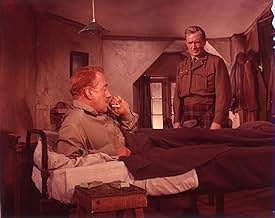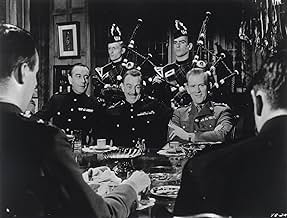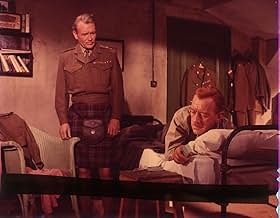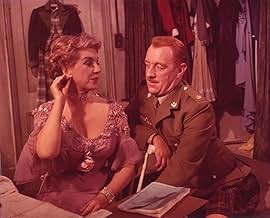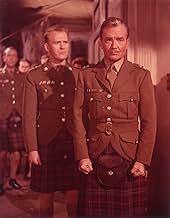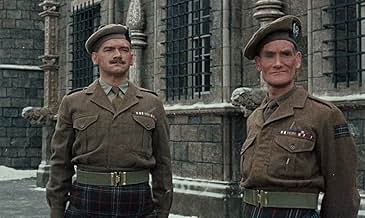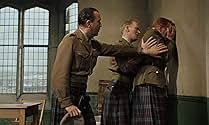After World War II, a Highland Regiment's acting Commanding Officer, who rose from the ranks, is replaced by a peace-time Oxford-educated Commanding Officer, leading to a dramatic conflict b... Read allAfter World War II, a Highland Regiment's acting Commanding Officer, who rose from the ranks, is replaced by a peace-time Oxford-educated Commanding Officer, leading to a dramatic conflict between the two.After World War II, a Highland Regiment's acting Commanding Officer, who rose from the ranks, is replaced by a peace-time Oxford-educated Commanding Officer, leading to a dramatic conflict between the two.
- Nominated for 1 Oscar
- 2 wins & 7 nominations total
Featured reviews
You will never know whether you should love or hate the two lead male actors this this movie. Just when you find yourself hating the Guiness character, you will be pulled in the opposite direction, and find yourself feeling sad for him. Same for everyone really in this story which is what makes it so engaging. The rich and privileged John Mills is easy to hate as he didn't have to work hard to get where he is. But that very stigma is what hurts him, as he is never really given a chance to be seen as anything more than a privileged fool, so then you pity him. Guiness plays a character who worked very hard for everything he has, and is to be admired until you realize he doesn't give any room for kindness, or compassion, and then you pity him too, but for different reasons. I saw this movie at 3:00 am on a work night, and couldn't move from the screen, despite my early day at work. I was pulled into this story that seemed too familar to me as we are all guilty of either judgement. Brilliant.
Rough-necked and uneducated Jock Sinclair (Alec Guinness) has fought his way through the ranks, and despite the love of hard drink and the odd highland fling, has proved himself in the very heat of battle. So much so that he has been made Acting Colonel of an (unnamed) Scottish regiment.
Sadly, for him, his informal barracks is going to be reformed under the auspices of the public school via Sandhurst graduate Lt. Col. Basil Barrow (John Mills) who believes in doing all things by-the-book. This sets the scene for a post WW2 power battle under a grey Scottish winter sky.
When writing a review of any excellent film - such as this - you are frightened you are going to put people off by its limits. However this is a classic example of less really being more. The claustrophobic atmosphere and the sense that armies without wars are prone to be heavy with politics. Not unlike like prisons: To many people in the same space with too much time on their hands. They drive men mad and extend the worst in the human character.
Guinness and Mills are fantastic actors. Oscar winners both and more. They could read the phone book and captivate an audience. For the record they had both seen war service, although Mills baby face and short stature had made him the butt of many jokes (many he was happy to re-tell). Did this help form his character? The guy who was laughed at and therefore worked even harder to enforce discipline or gain respect. This is, naturally, speculation.
I have no the knowledge of author (of book and film) but just by watching you know he has seen it for real. The little details that only the insider would know. The story would just as well be served as a theatre piece and it employs some its stock devices. The accidental narrator being the more obvious. Maybe this was to save money, but it would not have helped the picture to see - say - the incident that Mills had to endure from the Japanese.
Eyewitness testimony from the filming says that Guinness thought he would look silly in a kilt and used fake tanner on his pale legs. He is not the biggest of men and has to stick out his chest and stand on tiptoe to be imposing, but you do believe him. What an actor he was. An actor's actor. Like Peter Sellars, totally bland out of character (and not always very nice as he writes in his various autobiographies) but always mesmeric on screen. Mills - on the other hand - could never work as a bad guy. The perfect uncle figure who you would want to confide in.
(I am maybe giving the support cast short-shrift - but most British films of the time had quality character actors. No exception here. Amazing to see Susannah York in her first role.)
Alfred Hitchcock himself said Tunes of Glory was his own personal favourite film. It is not quite mine, but a great demonstration of how brilliant film can be when top class actors get their teeth in to a wonderful script. The end is pure Shakespeare. Don't watch it once, watch it twice...
Sadly, for him, his informal barracks is going to be reformed under the auspices of the public school via Sandhurst graduate Lt. Col. Basil Barrow (John Mills) who believes in doing all things by-the-book. This sets the scene for a post WW2 power battle under a grey Scottish winter sky.
When writing a review of any excellent film - such as this - you are frightened you are going to put people off by its limits. However this is a classic example of less really being more. The claustrophobic atmosphere and the sense that armies without wars are prone to be heavy with politics. Not unlike like prisons: To many people in the same space with too much time on their hands. They drive men mad and extend the worst in the human character.
Guinness and Mills are fantastic actors. Oscar winners both and more. They could read the phone book and captivate an audience. For the record they had both seen war service, although Mills baby face and short stature had made him the butt of many jokes (many he was happy to re-tell). Did this help form his character? The guy who was laughed at and therefore worked even harder to enforce discipline or gain respect. This is, naturally, speculation.
I have no the knowledge of author (of book and film) but just by watching you know he has seen it for real. The little details that only the insider would know. The story would just as well be served as a theatre piece and it employs some its stock devices. The accidental narrator being the more obvious. Maybe this was to save money, but it would not have helped the picture to see - say - the incident that Mills had to endure from the Japanese.
Eyewitness testimony from the filming says that Guinness thought he would look silly in a kilt and used fake tanner on his pale legs. He is not the biggest of men and has to stick out his chest and stand on tiptoe to be imposing, but you do believe him. What an actor he was. An actor's actor. Like Peter Sellars, totally bland out of character (and not always very nice as he writes in his various autobiographies) but always mesmeric on screen. Mills - on the other hand - could never work as a bad guy. The perfect uncle figure who you would want to confide in.
(I am maybe giving the support cast short-shrift - but most British films of the time had quality character actors. No exception here. Amazing to see Susannah York in her first role.)
Alfred Hitchcock himself said Tunes of Glory was his own personal favourite film. It is not quite mine, but a great demonstration of how brilliant film can be when top class actors get their teeth in to a wonderful script. The end is pure Shakespeare. Don't watch it once, watch it twice...
One of the marks of a truly great actor is the ability to do both comedy and heavy roles. To contrast Guinness's portrayal here of Jock Sinclair with, say, his Professor Marcus in 'The Ladykillers' is to become aware of the protean range of his talent. (One cannot imagine, for instance, John Wayne doing comedy.) To my mind Alec Guinness is the premier actor of the century; his performances have immeasurably enriched my inner life.
I am not as enamored of "Tunes of Glory" as I am of, say, "Bridge on the River Kwai," but it is without question a powerful movie. The conflict between Sinclair and Barrow is palpable; I think, in particular, of Mill's violently trembling rage during the dancing scene, and Guinness's dismissive ridicule of Barrow's deepest confidences ("toy soldiers!") during his attempt to con him into clemency. Sinclair's grief-stricken collapse at the end is truly an unforgettable scene and a tribute to Guinness's power.
I am not as enamored of "Tunes of Glory" as I am of, say, "Bridge on the River Kwai," but it is without question a powerful movie. The conflict between Sinclair and Barrow is palpable; I think, in particular, of Mill's violently trembling rage during the dancing scene, and Guinness's dismissive ridicule of Barrow's deepest confidences ("toy soldiers!") during his attempt to con him into clemency. Sinclair's grief-stricken collapse at the end is truly an unforgettable scene and a tribute to Guinness's power.
10coop-16
I finally had the chance to see this film in its entirety on Bravo a few days ago. Ronald Neame was not a director of the first rank, and he probably wasnt even a director of the second, but this is NOT a directors picture. It is a picture carried by superb acting and a brilliant script.I am now convinced that Guinness was one of the greatest screen actors that ever lived-if not the greatest.. This performance surpasses even his Colonel Nicholson in Bridge on the River Kwai, or his magnificent performances in the Ealing comedies. His boorish, arrogant, but oddly touching and vulnerable Jock Sinclair is a full length portrait worthy of Rembrandt-or Dostoevsky.John Mills, as the "by the book " colonel, whose aloof exterior hides enormous psychic scars, is almost equally good.Dennis Price, as a friend who turns his back on Sinclair, and the superb Gordon Jackson ( he was a great actor long, long before Upstairs Downstairs)as a restrained, sensitive officer who tries ineffectually to help both antagonists, are almost equally good. All of the other performances are very fine.The films beautifully written, sometimes funny, usually achingly sad script is a profound meditation on honor, tradition, repression and class conflict. Guinnesses soliloquy at the end is one of the most heart-breaking moments in all of film.
British military drama starring Alec Guinness as Maj. Sinclair, the loud, boisterous commanding officer of a Scottish regiment in the years after WWII. Higher ups decide that Sinclair isn't an appropriate peacetime commander, so they send Col. Barrow (John Mills) to replace him. Barrow is a strict ruler-follower who likes life quiet, sober, and "respectable". This sets the stage for a battle of wills between the two officers.
I've heard of this movie for a long time, and knew that it was well-liked (Guinness considered it one of his best performances), but it wasn't what I was expecting. It's a psychological study of these two men, and, with the Barrow character, an early examination of PTSD before it was called that (he was a P. O. W. In a Japanese camp, and was tortured). The accents can be a bit much, and if you don't like bagpipes, this is definitely not the movie for you, but I thought the acting was terrific, and the slow-burn drama builds to a shattering conclusion.
I've heard of this movie for a long time, and knew that it was well-liked (Guinness considered it one of his best performances), but it wasn't what I was expecting. It's a psychological study of these two men, and, with the Barrow character, an early examination of PTSD before it was called that (he was a P. O. W. In a Japanese camp, and was tortured). The accents can be a bit much, and if you don't like bagpipes, this is definitely not the movie for you, but I thought the acting was terrific, and the slow-burn drama builds to a shattering conclusion.
Did you know
- TriviaSir Alec Guinness was offered the role of Lieutenant Colonel Barrow, but asked for the role of Major Sinclair instead. He then suggested Sir John Mills for the other role.
- GoofsPipe Major MacLean is never shown with a set of bagpipes. In particular, he is a mere observer at band practice. A pipe major is not only the leader of the band but also its chief instructor, and it is unthinkable that he would not play an active role in all practices.
- Quotes
Major Jock Sinclair, D.S.O., M.M.: We're on a first name basis in this regiment. Your first name is Derek. My first name is Major.
- ConnectionsFeatured in Film Extra: Alec Guiness (1973)
- How long is Tunes of Glory?Powered by Alexa
Details
- Runtime
- 1h 46m(106 min)
- Color
- Aspect ratio
- 1.66 : 1
Contribute to this page
Suggest an edit or add missing content


